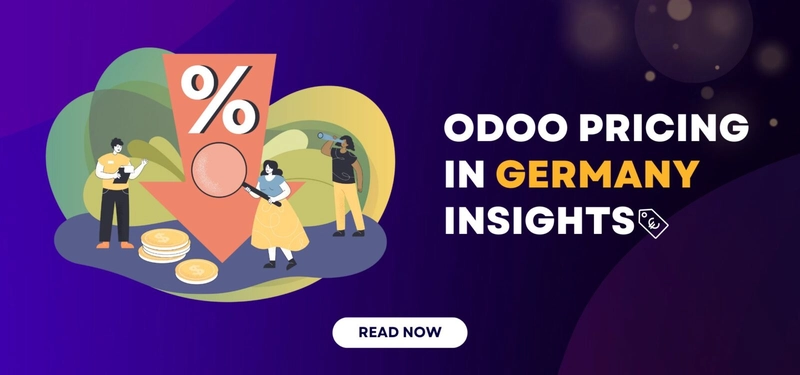Introduction
Enterprise Resource Planning (ERP) systems have become essential for businesses that want to streamline operations, reduce manual work, and improve efficiency. Among the many ERP solutions available, Odoo has established itself as a flexible and cost-effective choice worldwide. In Germany, where businesses operate under a competitive and regulated environment, the question of Odoo pricing in Germany often arises for companies considering ERP adoption. Understanding the pricing model, available plans, and hidden factors is crucial for making the right decision.
How Odoo Pricing Works Globally
Before focusing on the German market, it’s useful to understand how Odoo structures its pricing overall. Odoo offers two main editions:
-
Odoo Community (free edition): An open-source version that provides essential ERP modules. It requires more customization and technical support, often making it suitable for startups or companies with strong in-house IT teams.
-
Odoo Enterprise (paid edition): A commercial version that includes advanced features, regular updates, hosting options, and official Odoo support.
The Odoo Enterprise pricing is subscription-based. Costs depend on the number of users, selected applications, and hosting type (Odoo Online, Odoo.sh, or On-Premise). This structure makes Odoo more flexible than many traditional ERP providers, but it also means total pricing varies depending on business needs.
Odoo Pricing in Germany: The Basics
For businesses in Germany, Odoo’s official pricing generally aligns with its global model but reflects local considerations like taxes, compliance, and support requirements.
- User Licenses: Pricing is charged per user per month. For small teams, this can be very cost-effective, but costs scale with company size.
- App Selection: Companies pay only for the apps they need. For instance, a retail business may choose POS and inventory apps, while a manufacturer might require MRP, quality, and accounting.
- Hosting Choice: German businesses often prefer cloud hosting due to ease of maintenance, but on-premise hosting is also common for companies with strict data security requirements.
This flexibility allows firms to design an ERP setup that matches their budget and operational needs.
Why Pricing Varies in Germany
When evaluating Odoo pricing in Germany, it’s important to recognize factors that influence overall costs beyond the license fee:
- Customization Needs – Many German businesses require ERP systems tailored to industry-specific processes, which may add to development costs.
- Regulatory Compliance – German tax laws and accounting standards (like GoBD) demand accurate compliance. Odoo apps often need localization or additional modules for this.
- Implementation Services – Partnering with an Odoo implementation company in Germany adds service fees but ensures smoother deployment.
- Support & Maintenance – Ongoing support packages vary depending on whether a company uses Odoo directly or works with a certified local partner.
These elements can make the difference between an affordable subscription and a larger ERP investment.
Comparing Odoo Pricing with Other ERP Systems in Germany
One reason Odoo is gaining popularity is its cost advantage compared to traditional ERP giants. In Germany, systems like SAP or Microsoft Dynamics often involve high licensing fees and long implementation times. By contrast, Odoo pricing in Germany remains attractive because it allows businesses to start small and scale as they grow.
For mid-sized companies, Odoo offers an accessible entry point without compromising functionality. For large enterprises, the modular approach ensures costs align with actual requirements, rather than forcing businesses into costly all-in-one packages.
Real-World Scenarios for German Businesses
To illustrate how Odoo pricing in Germany plays out in practice:
- A startup in Berlin with five employees may begin with the CRM, invoicing, and accounting apps. Their monthly subscription remains modest, while they leverage community forums for additional support.
- A manufacturing firm in Munich may require advanced MRP, inventory, and quality control apps for 50 employees. While their subscription costs are higher, the system still undercuts many competitors while remaining flexible.
- A retail chain in Hamburg can adopt POS, eCommerce, and stock management modules, scaling licenses as new outlets open.
These scenarios show that costs are highly adaptable depending on business size and scope.
Key Benefits Behind the Pricing
When German companies evaluate pricing, they are not just buying software but long-term value. Key benefits include:
-
Scalability: Businesses can add users and apps as they expand.
-
Localization: Support for German accounting rules ensures compliance.
-
Flexibility: Choose only the apps needed instead of paying for unnecessary tools.
-
Transparency: Clear subscription costs reduce financial uncertainty.
Final Thoughts
For businesses exploring ERP solutions, Odoo pricing in Germany presents a balance between affordability and functionality. While the official license cost is straightforward, total investment depends on factors like customization, compliance, and support. By carefully mapping requirements and working with experienced Odoo partners, German businesses can achieve a system that grows with them—without the hefty costs often associated with traditional ERP providers.







